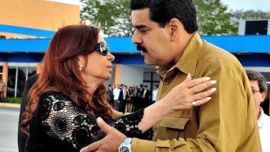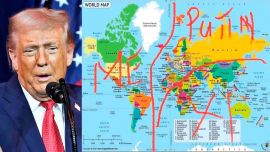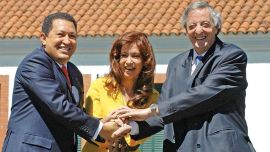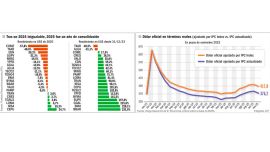There the environment has been squeezed into the third thematic cluster alongside social welfare and housing – on the unlikely assumption that each candidate gives equal time to environmental issues in his two-minute presentation and one-minute follow-up time instead of concentrating almost entirely on the more pressing social problems, we can thus hope to hear a maximum of six minutes on what the next government proposes to do against the biggest existential threat facing this planet.
But then again, there’s nothing very new about the environment being an orphan of Argentine politics. There was not even a permanent government department addressing the subject until 1991 (although the 1973-1976 Peronist government did create a pioneering secretariat, immediately crushed by the military dictatorship). Carlos Menem restored the portfolio but his choice to head it turned out to be a bad joke, María Julia Alsogaray. Her successors were non-entities lacking any serious qualifications with the exception of Romina Picolotti (2006-2008), a prize-winning environmental activist who however proved unable to control her family’s lavish use of public funds and was fired for nepotism and corruption. For the rest of Kirchnerism the post became for some strange reason the personal choice of the Cabinet chief (especially Aníbal Fernández and Jorge Capitanich, Chaco governor-elect as of last Sunday, with Alberto Fernández already gone at the time) and invariably a political crony. In 2015 Mauricio Macri promoted the department to a ministry (only to downgrade it again last year) but made the eccentric choice of a rabbi with zero background to head it.
But that was then and this is now – what can we expect from the government which will be elected next weekend? Macri at least can be gauged on a broader basis than tomorrow’s minute of debate (if that) with a track record of almost four years in office. Aside from the institutional ups and downs of the area, environmental spending does not even reach 0.1 percent of gross domestic product although Macri does have to his credit a major drive towards renewable energy, launching over 150 projects (around a third operational) which have already more than doubled the share of the national energy grid to six percent with a full potential of 15 percent – a drive which has lost steam with the austerity over the last year. Yet the president has also pinned much higher hopes and given far more profile to Vaca Muerta shale, which has now expanded to average two daily spills – and if Vaca Muerta has slowed down this year, it is more due to a cash-strapped government’s inability to support international oil prices than any environmental conscience.
The main opposition candidate Alberto Fernández offers little hope of improving on this patchy record as, if anything, even keener on environmentally hazardous cash cows irrespective of pollution – far from restoring the environment to ministerial status, he proposes to create a Mining Ministry offering tax breaks. In general, Fernández would submit environmental policy to a federal pact between the national government and the provinces, many of which value mining and oil royalties above all else (such as San Juan, where Fernández delivered an especially enthusiastic speech in favour of mega-mining). The supreme importance attached to the dollars earned from agricultural, energy and mining exports (sectors accounting for over 91 percent of the country’s pollution between them with the former also causing rampant deforestation) is a common denominator among the candidates with an almost total absence of environmental platforms – the exception here would be the leftist Frente de Izquierda (FIT), whose recent campaign spots seem to have detected this vacuum with some green-tinged slogans.
Yet one chronic flaw in Argentina is to expect everything from the government – change does not have to be top-down. Even if the march on Congress in the week of the UN General Assembly was impressive, this country is still looking for its Greta Thunberg, despite the best efforts of activists such as Bruno Rodríguez and Chiara Sacchi and others. Above all, we need to disabuse ourselves of the idea that the environment is only a problem for people with money who do not have other urgencies – half our children may live in poverty, which is already disastrous, but all of them face a future with far less resources and natural beauty than we enjoy unless we can look ahead and change. Everybody and not just the six men facing the cameras tomorrow.


















Comments